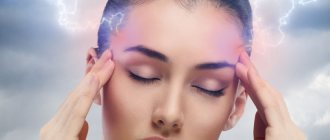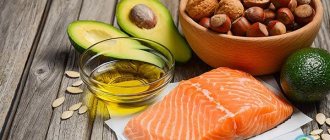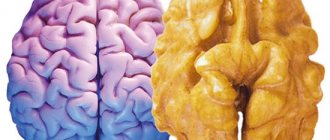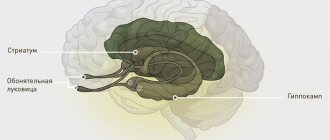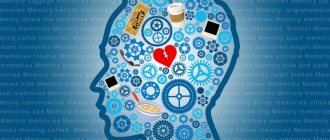It's amazing how little we know about the brain and how it works. It is reliably known that the brain is capable of generating electrical impulses and can power a 25-watt light bulb! Now imagine how much effort and energy is expended to maintain all vital processes normal, how many resources are needed to control life activity at the highest levels. How does this happen and why? And where does the brain get the energy for such powerful organizational work? Is it possible to prolong the tone and youth of the brain
and how to charge your brain, we tell you in the article.
How does the brain work?
The brain is like jelly, and brittle jelly at that. To avoid damage and injury, nature made sure that it was reliably protected. Firstly, a strong skull, and secondly, a soft shell of connective tissue that prevents the brain from hitting the walls of the skull. And finally, the cerebrospinal fluid inside the skull protects the brain from concussions and injuries.
What is the brain?
This is approximately one and a half kilograms of “smart” mass in the human body, consisting of billions of neurons, processes of nerve cells (axons), through which nerve impulses and signals are transmitted.
Moreover, each signal is generated and received by a specific part of the brain. To ensure that there are no malfunctions in its functioning, the brain requires 20% of all oxygen carried by the cells of the body, fats and carbohydrates in sufficient quantities. Their deficiency leads to disturbances in concentration and memory, provokes psychosis, depressive states
and disables other systems and organs. Often, disorders are observed in those who regularly experiment with diets and food restrictions. People who feel hungry are also among those whose brain cells are primarily affected - irritation and aggression appear.
What functions does the brain have?
The brain is our everything! It determines whether we raise our hand, scratch our heads, cry or laugh, fall in love, remember it or forget it. The quality of the processes occurring in the brain determines whether we will live long and happily or whether we will suffer, whether we will be healthy or sick. What we will or will not become, what talents we will develop and what characters we will have. The brain controls everything and even a little more than we think. As the main organ of the central nervous system, it has a clear hierarchy of functions. Each zone is responsible for specific functions.
- The frontal lobe is responsible for conscious movements, for speech and the ability to write, for our will and desire to achieve results.
- The temporal zones are responsible for the perception of speech, auditory and visual information, long-term memory, facial recognition, and are responsible for musical hearing, rhythm and musical perception.
- The parietal zone is responsible for orientation in space, conscious movements, sensation of one’s body and its parts, recognition of objects, mental calculations, sensation of pain, touch, high and low temperatures.
- The occipital zone is responsible for processing visual information. The eyes are a device that reads the picture of the world around us through exposure to light. But it is the back of the brain that converts it, converting light into electrical impulses.
- The cerebellum is responsible for maintaining balance and coordinating movements.
The brain always works, constantly and completely, and not 3-5%, as stated. Even in a dream. The statement that the brain rests at night is not entirely true. The functioning of the brain in a state of rest at night differs only in the activity of the regions. Recent research conducted by the author of the visceral theory of sleep, Ivan Nikolaevich Pigarev, a specialist in the field of vision physiology and sleep physiology
, they prove that the brain works even more actively during sleep.
More precisely, the frequency of impulses in the cerebral cortex increases. But what's going on there? It is at the moment of sleep that the subconscious comes on the scene, the sorting and distribution of the gained experience, emotions and knowledge occurs, and most importantly, the restoration of the body’s systems and organs. He argues that drowsiness
is a signal from the body that it needs a “technical inspection” and recovery.
How many resources does the brain need daily?
Understanding what a colossal amount of data is contained in the brain and how many functions it performs, a reasonable question arises - what is needed to improve the quality of the brain, improve its capabilities and prolong the youth of its cells? And are there any pills that, like in the movies, would turn the brain into a supercomputer?
Share and prosper
Economists since the times of A. Smith and A. Weber have noticed that progress in the development of productive power from labor, art, skill or intelligence is a consequence of the division of labor. The division of labor in this sense is the most important and indispensable condition for the progressive development of the economy of any state, any society. This principle of separation of “labor” responsibilities can be fully applied to the work of complex biological systems.
Evolutionarily, it so happened that the principle of separation of cell functions made it possible to “pump up” each individual ability of the body. The increasing complexity and specialization of functions eventually led to the need for their coordination and, as a result, an increase in the load on the brain. As a result, neurons completely abandoned housekeeping and increased the amount of useful work. And since it is impossible to work well and for a long time without home life and a reliable rear, constant worries about the state of neurons have passed to astrocytes. Consolidation of cell functions has already occurred at the level of energy sources. The lack of competition for food sources allowed astrocytes and neurons to concentrate on their functions. As a result, it turned out so well that energy reserves began to be enough not only for the coordination of body functions that ensure survival, but also for “hackwork” in the form of conscious activity, which greatly advanced the animals in the efficiency of their work.
Brain nutrition
The brain spends the lion's share of the resources received in one day. So, for daily self-care at rest (let’s assume that this is a normal day in “light” mode, without physical activity and costly intellectual activity), the brain will spend 250 kcal. If a person turns on the increased difficulty mode, the brain will take the required 750-1000 calories from the daily calorie intake. Now imagine that a person on a diet with a caloric intake of 1300-1500 will simply collapse at the end of the day, even in “light” mode. After all, in order to go to work every day, manage the baby at home, engage in physical labor, pump up the abs, prepare food, consume and digest, the body requires a minimum of 2000 kcal, not counting the cost of maintaining the brain +500 kcal on average. You will definitely be able to lose weight quickly. But there is no need to say that a person with a limited diet will successfully overcome everyday stressful situations and loads and achieve good results in the professional field or in sports.
Cholesterol
The brain makes up only 2% of the body's weight, but it accounts for 25% of the total cholesterol in the body; moreover, a fifth of the brain's weight is cholesterol. It forms membranes that surround cells, keeping them permeable and “waterproof” so that different chemical reactions can take place inside and outside. Essentially, in the brain, cholesterol acts as a messenger that allows cells to communicate and function well. In addition, it is a powerful antioxidant and protects the brain from the damaging effects of free radicals. Cholesterol is a precursor to important steroid hormones such as estrogen and androgens, as well as vitamin D, which has anti-inflammatory properties and helps the body get rid of infection.
People with various neurodegenerative diseases - Parkinson's disease, Alzheimer's disease and multiple sclerosis - have low levels of vitamin D, which is formed directly from cholesterol. One of the most common myths that I constantly debunk is that the brain prefers to eat glucose. Nothing like this! The brain can be perfectly fueled by fat, in fact, it is considered superfuel for the brain. But we live in a society that continues to portray fat and cholesterol as dangerous as cyanide. We fight them, not suspecting that it destroys us.
Vitamins for the mind
In addition to energy costs, the brain really needs vitamins and microelements
. Their deficiency in the body can be constantly created. The reason may be regular physical activity, poor nutrition, diets, stress, lack of sleep, changes in seasons, disruptions in the functioning of certain organs and systems (gastrointestinal tract or endocrine system), for which, again, the brain is responsible.
You remember this famous phrase - all diseases are from nerves? This is the absolute truth! And the leader of the entire nervous system is the brain! Thus, by controlling the brain and regularly nourishing it, you can not only pump up the nervous system, but also protect yourself from many diseases.
Scientists agree that the average human life expectancy is greatly underestimated. In reality, under ideal conditions, healthy sleep, quality nutrition, regular meditative practices (a tool for relieving stress, improving the nervous system, intellectual and spiritual growth), Homo Sapiens can easily live to 150. Of course, vitamin supplements alone will not make you live to 150 years, but they will definitely be able to help on the way to the coveted figure.
Vitamins for the mind
Intelligence, like triceps, can be pumped up. And in order to ensure the youth and plasticity of the mind, its clarity and freshness, it is better to do pumping daily. What vitamins can help in this difficult but extremely important task?
B vitamins
- ensure the normal functioning of the transmission of nerve impulses from neuron to neuron, improve blood supply to the brain, and with it, increasing the access of oxygen - one of the main resources of the brain.
They nourish the nervous system, preventing insomnia, depression and fatigue - something on which the quality of brain cells, the quality of neural connections and transmitted impulses directly depends. What to take: Pentovit, Combilipen, Gerimax Energy, Angiovit, Pyridoxine, Neuromultivit
Vitamins of group P
. Today, 5,000 substances are known that have properties identical to vitamins of group P. These include flavonoids, anthocyanidins, and isoflavonoids - powerful antioxidants. Vitamins of group P protect the brain and blood vessels and improve their tone. Slow down oxidative processes in the body, improve cellular metabolism.
What to take:
Ascorutin, Troxevasin, Venoruton
Vitamin C
- the deficiency of which causes connective tissue degeneration in the body, slowing down or stopping the production of collagen.
Due to a lack of vitamin C, the balance of enzymes necessary for the functioning of organs and systems is disrupted. The vitamin acts as a catalyst for metabolic processes. Protects the body and brain, protects against mental or physical stress. What to take: Ascorbic acid, Revit, Vitamin C effervescent Omega-3
is a source of docosahexaenoic, eicosapentaenoic and linolenic acids, which the body does not synthesize on its own. And they have an important function - neuroprotective. Omega-3 allows you to increase and maintain mental activity, especially under stress and seasonal blues.
What to take: Doppelhertz Active Omega, Doppelhertz Active Potassium + Magnesium, Solgar Omega, Solgar fish oil concentrate
Vitamin E
- is a valuable substance of the cell membrane in brain cells.
Due to the vitamin, the body produces the biomarker DHA-PC, the deficiency of which increases the chances of developing Alzheimer's disease. Vitamin E prevents significant loss of molecules that are very important for the brain and the death of neurons. What to take: Vitamin E, Tocopherol acetate
Polivit amines and drugs that improve brain activity and nutrition of brain cells
with proven effectiveness
: Ginkgo Biloba, Vitrum Memory, Nootropic, Glycine.
Strict control
To fine-tune the rate of glycolysis (high in astrocytes and relatively low in neurons), the regulatory enzyme 6-phosphofructo-2-kinase/fructose-2,6-bisphosphatase (PFKFB) works in all brain cells [7]. The high level of PFKFB enzymatic activity in astrocytes contributes to the high rate of glycolytic reactions in them. However, what happens if neurons reduce the rate of the main PFP and, like astrocytes, establish glycolytic processes? It has been experimentally shown that this will be followed by a catastrophe—the death of neurons. The fact is that such an increase in glycolysis in neurons leads to a reduction in the formation of the enzyme of the antioxidant system - glutathione (by the way, the only peptide substance formed directly in neurons and saving them from oxidative stress), increased oxidative stress and, finally, to apoptotic cell death. Thus, the separation of energy pathways turns out to be a process strictly adapted to increasing the energy output of the brain and at the same time very conservative from the point of view of the possibility of implementation in different types of cells.
